×
Il semble que vous utilisiez une version obsolète de internet explorer. Internet explorer n'est plus supporté par Microsoft depuis fin 2015. Nous vous invitons à utiliser un navigateur plus récent tel que Firefox, Google Chrome ou Microsoft Edge.
My Player placeholder

Devenez membre d'Incathlab et bénéficiez d'un accès complet !
Vous devez être membre pour accéder aux vidéos Incathlab sans limitation. Inscrivez vous gratuitement en moins d'une minute et accédez à tous les services Incathlab ! Vous avez aussi la possibilité de vous connecter directement avec votre compte facebook ou twitter en cliquant sur login en haut à droite du site.
Inscription Connexion
Inscription Connexion
Date du tournage : 02/08/2023
Dernière mise à jour : 27/09/2023
Dernière mise à jour : 27/09/2023
Alex & Friends
Discover a NEW CTO Live Cases series This series will bring together members of the CTO community to chat and share their experiences. Every month Alexandre Avran will invite a ...
Partager
Participer à la discussion
Suggestions
Discover now !
Everything you wanted to know about Recross without having to ask
Alex & The Young Generation - Ep.12
Partager
Jeudi 10 mars 2022 de 18h à 19h (GMT+1)
Honolulu : Jeudi 10 mars 2022 de 06h à 07h (GMT+1)
San Francisco : Jeudi 10 mars 2022 de 08h à 09h (GMT+1)
New York : Jeudi 10 mars 2022 de 11h à 12h (GMT+1)
Buenos Aires : Jeudi 10 mars 2022 de 13h à 14h (GMT+1)
London / Dublin : Jeudi 10 mars 2022 de 16h à 17h (GMT+1)
Paris / Berlin : Jeudi 10 mars 2022 de 17h à 18h (GMT+1)
Istanbul : Jeudi 10 mars 2022 de 18h à 19h (GMT+1)
Moscou / Dubaï : Jeudi 10 mars 2022 de 20h à 21h (GMT+1)
Bangkok : Jeudi 10 mars 2022 de 23h à 00h (GMT+1)
Shanghai : Vendredi 11 mars 2022 de 00h à 01h (GMT+1)
Tokyo : Vendredi 11 mars 2022 de 01h à 02h (GMT+1)
Sydney : Vendredi 11 mars 2022 de 02h à 03h (GMT+1)
Wellington : Vendredi 11 mars 2022 de 04h à 05h (GMT+1)
San Francisco : Jeudi 10 mars 2022 de 08h à 09h (GMT+1)
New York : Jeudi 10 mars 2022 de 11h à 12h (GMT+1)
Buenos Aires : Jeudi 10 mars 2022 de 13h à 14h (GMT+1)
London / Dublin : Jeudi 10 mars 2022 de 16h à 17h (GMT+1)
Paris / Berlin : Jeudi 10 mars 2022 de 17h à 18h (GMT+1)
Istanbul : Jeudi 10 mars 2022 de 18h à 19h (GMT+1)
Moscou / Dubaï : Jeudi 10 mars 2022 de 20h à 21h (GMT+1)
Bangkok : Jeudi 10 mars 2022 de 23h à 00h (GMT+1)
Shanghai : Vendredi 11 mars 2022 de 00h à 01h (GMT+1)
Tokyo : Vendredi 11 mars 2022 de 01h à 02h (GMT+1)
Sydney : Vendredi 11 mars 2022 de 02h à 03h (GMT+1)
Wellington : Vendredi 11 mars 2022 de 04h à 05h (GMT+1)
Le rôle de l’assistance circulatoire mécanique en cas de choc cardiogénique et d'ICP à haut ri...
Partager
Mardi 29 mars 2022 de 18h à 19h (GMT+2)
Honolulu : Mardi 29 mars 2022 de 06h à 07h (GMT+2)
San Francisco : Mardi 29 mars 2022 de 09h à 10h (GMT+2)
New York : Mardi 29 mars 2022 de 12h à 13h (GMT+2)
Buenos Aires : Mardi 29 mars 2022 de 13h à 14h (GMT+2)
Reykjavik : Mardi 29 mars 2022 de 16h à 17h (GMT+2)
London / Dublin : Mardi 29 mars 2022 de 17h à 18h (GMT+2)
Paris / Berlin : Mardi 29 mars 2022 de 18h à 19h (GMT+2)
Istanbul : Mardi 29 mars 2022 de 19h à 20h (GMT+2)
Moscou / Dubaï : Mardi 29 mars 2022 de 20h à 21h (GMT+2)
Bangkok : Mardi 29 mars 2022 de 23h à 00h (GMT+2)
Shanghai : Mercredi 30 mars 2022 de 00h à 01h (GMT+2)
Tokyo : Mercredi 30 mars 2022 de 01h à 02h (GMT+2)
Sydney : Mercredi 30 mars 2022 de 03h à 04h (GMT+2)
Wellington : Mercredi 30 mars 2022 de 05h à 06h (GMT+2)
San Francisco : Mardi 29 mars 2022 de 09h à 10h (GMT+2)
New York : Mardi 29 mars 2022 de 12h à 13h (GMT+2)
Buenos Aires : Mardi 29 mars 2022 de 13h à 14h (GMT+2)
Reykjavik : Mardi 29 mars 2022 de 16h à 17h (GMT+2)
London / Dublin : Mardi 29 mars 2022 de 17h à 18h (GMT+2)
Paris / Berlin : Mardi 29 mars 2022 de 18h à 19h (GMT+2)
Istanbul : Mardi 29 mars 2022 de 19h à 20h (GMT+2)
Moscou / Dubaï : Mardi 29 mars 2022 de 20h à 21h (GMT+2)
Bangkok : Mardi 29 mars 2022 de 23h à 00h (GMT+2)
Shanghai : Mercredi 30 mars 2022 de 00h à 01h (GMT+2)
Tokyo : Mercredi 30 mars 2022 de 01h à 02h (GMT+2)
Sydney : Mercredi 30 mars 2022 de 03h à 04h (GMT+2)
Wellington : Mercredi 30 mars 2022 de 05h à 06h (GMT+2)
The Role of Mechanical Circulatory Support in Complex VT Cases
Partager
Jeudi 25 août 2022 de 18h à 19h06 (GMT+2)
Honolulu : Jeudi 25 août 2022 de 06h à 07h06 (GMT+2)
San Francisco : Jeudi 25 août 2022 de 09h à 10h06 (GMT+2)
New York : Jeudi 25 août 2022 de 12h à 13h06 (GMT+2)
Buenos Aires : Jeudi 25 août 2022 de 13h à 14h06 (GMT+2)
Reykjavik : Jeudi 25 août 2022 de 16h à 17h06 (GMT+2)
London / Dublin : Jeudi 25 août 2022 de 17h à 18h06 (GMT+2)
Paris / Berlin : Jeudi 25 août 2022 de 18h à 19h06 (GMT+2)
Istanbul : Jeudi 25 août 2022 de 19h à 20h06 (GMT+2)
Moscou / Dubaï : Jeudi 25 août 2022 de 20h à 21h06 (GMT+2)
Bangkok : Jeudi 25 août 2022 de 23h à 00h06 (GMT+2)
Shanghai : Vendredi 26 août 2022 de 00h à 01h06 (GMT+2)
Tokyo : Vendredi 26 août 2022 de 01h à 02h06 (GMT+2)
Sydney : Vendredi 26 août 2022 de 03h à 04h06 (GMT+2)
Wellington : Vendredi 26 août 2022 de 05h à 06h06 (GMT+2)
San Francisco : Jeudi 25 août 2022 de 09h à 10h06 (GMT+2)
New York : Jeudi 25 août 2022 de 12h à 13h06 (GMT+2)
Buenos Aires : Jeudi 25 août 2022 de 13h à 14h06 (GMT+2)
Reykjavik : Jeudi 25 août 2022 de 16h à 17h06 (GMT+2)
London / Dublin : Jeudi 25 août 2022 de 17h à 18h06 (GMT+2)
Paris / Berlin : Jeudi 25 août 2022 de 18h à 19h06 (GMT+2)
Istanbul : Jeudi 25 août 2022 de 19h à 20h06 (GMT+2)
Moscou / Dubaï : Jeudi 25 août 2022 de 20h à 21h06 (GMT+2)
Bangkok : Jeudi 25 août 2022 de 23h à 00h06 (GMT+2)
Shanghai : Vendredi 26 août 2022 de 00h à 01h06 (GMT+2)
Tokyo : Vendredi 26 août 2022 de 01h à 02h06 (GMT+2)
Sydney : Vendredi 26 août 2022 de 03h à 04h06 (GMT+2)
Wellington : Vendredi 26 août 2022 de 05h à 06h06 (GMT+2)
SmartAssist and Connect Function – Improved Patient Outcome
Impella Case Club
Partager
Mardi 4 octobre 2022 de 17h à 18h15 (GMT+2)
Honolulu : Mardi 4 octobre 2022 de 05h à 06h15 (GMT+2)
San Francisco : Mardi 4 octobre 2022 de 08h à 09h15 (GMT+2)
New York : Mardi 4 octobre 2022 de 11h à 12h15 (GMT+2)
Buenos Aires : Mardi 4 octobre 2022 de 12h à 13h15 (GMT+2)
Reykjavik : Mardi 4 octobre 2022 de 15h à 16h15 (GMT+2)
London / Dublin : Mardi 4 octobre 2022 de 16h à 17h15 (GMT+2)
Paris / Berlin : Mardi 4 octobre 2022 de 17h à 18h15 (GMT+2)
Istanbul : Mardi 4 octobre 2022 de 18h à 19h15 (GMT+2)
Moscou / Dubaï : Mardi 4 octobre 2022 de 19h à 20h15 (GMT+2)
Bangkok : Mardi 4 octobre 2022 de 22h à 23h15 (GMT+2)
Shanghai : Mardi 4 octobre 2022 de 23h à 00h15 (GMT+2)
Tokyo : Mercredi 5 octobre 2022 de 00h à 01h15 (GMT+2)
Sydney : Mercredi 5 octobre 2022 de 02h à 03h15 (GMT+2)
Wellington : Mercredi 5 octobre 2022 de 04h à 05h15 (GMT+2)
San Francisco : Mardi 4 octobre 2022 de 08h à 09h15 (GMT+2)
New York : Mardi 4 octobre 2022 de 11h à 12h15 (GMT+2)
Buenos Aires : Mardi 4 octobre 2022 de 12h à 13h15 (GMT+2)
Reykjavik : Mardi 4 octobre 2022 de 15h à 16h15 (GMT+2)
London / Dublin : Mardi 4 octobre 2022 de 16h à 17h15 (GMT+2)
Paris / Berlin : Mardi 4 octobre 2022 de 17h à 18h15 (GMT+2)
Istanbul : Mardi 4 octobre 2022 de 18h à 19h15 (GMT+2)
Moscou / Dubaï : Mardi 4 octobre 2022 de 19h à 20h15 (GMT+2)
Bangkok : Mardi 4 octobre 2022 de 22h à 23h15 (GMT+2)
Shanghai : Mardi 4 octobre 2022 de 23h à 00h15 (GMT+2)
Tokyo : Mercredi 5 octobre 2022 de 00h à 01h15 (GMT+2)
Sydney : Mercredi 5 octobre 2022 de 02h à 03h15 (GMT+2)
Wellington : Mercredi 5 octobre 2022 de 04h à 05h15 (GMT+2)
Quand le patient et l’angiographie racontent des histoires différentes
Pourquoi le diagnostic des anomalies ou dysfonctions microcirculatoires est important
Partager
Mercredi 26 avril 2023 de 13h à 14h30 (GMT+2)
Honolulu : Mercredi 26 avril 2023 de 01h à 02h30 (GMT+2)
San Francisco : Mercredi 26 avril 2023 de 04h à 05h30 (GMT+2)
New York : Mercredi 26 avril 2023 de 07h à 08h30 (GMT+2)
Buenos Aires : Mercredi 26 avril 2023 de 08h à 09h30 (GMT+2)
Reykjavik : Mercredi 26 avril 2023 de 11h à 12h30 (GMT+2)
London / Dublin : Mercredi 26 avril 2023 de 12h à 13h30 (GMT+2)
Paris / Berlin : Mercredi 26 avril 2023 de 13h à 14h30 (GMT+2)
Istanbul : Mercredi 26 avril 2023 de 14h à 15h30 (GMT+2)
Moscou / Dubaï : Mercredi 26 avril 2023 de 15h à 16h30 (GMT+2)
Bangkok : Mercredi 26 avril 2023 de 18h à 19h30 (GMT+2)
Shanghai : Mercredi 26 avril 2023 de 19h à 20h30 (GMT+2)
Tokyo : Mercredi 26 avril 2023 de 20h à 21h30 (GMT+2)
Sydney : Mercredi 26 avril 2023 de 22h à 23h30 (GMT+2)
Wellington : Jeudi 27 avril 2023 de 00h à 01h30 (GMT+2)
San Francisco : Mercredi 26 avril 2023 de 04h à 05h30 (GMT+2)
New York : Mercredi 26 avril 2023 de 07h à 08h30 (GMT+2)
Buenos Aires : Mercredi 26 avril 2023 de 08h à 09h30 (GMT+2)
Reykjavik : Mercredi 26 avril 2023 de 11h à 12h30 (GMT+2)
London / Dublin : Mercredi 26 avril 2023 de 12h à 13h30 (GMT+2)
Paris / Berlin : Mercredi 26 avril 2023 de 13h à 14h30 (GMT+2)
Istanbul : Mercredi 26 avril 2023 de 14h à 15h30 (GMT+2)
Moscou / Dubaï : Mercredi 26 avril 2023 de 15h à 16h30 (GMT+2)
Bangkok : Mercredi 26 avril 2023 de 18h à 19h30 (GMT+2)
Shanghai : Mercredi 26 avril 2023 de 19h à 20h30 (GMT+2)
Tokyo : Mercredi 26 avril 2023 de 20h à 21h30 (GMT+2)
Sydney : Mercredi 26 avril 2023 de 22h à 23h30 (GMT+2)
Wellington : Jeudi 27 avril 2023 de 00h à 01h30 (GMT+2)
CAMP LIVE CASE
European Session from Luzerner Kantonsspital
Partager
Mercredi 21 juin 2023 de 16h à 17h30 (GMT+2)
Honolulu : Mercredi 21 juin 2023 de 04h à 05h30 (GMT+2)
San Francisco : Mercredi 21 juin 2023 de 07h à 08h30 (GMT+2)
New York : Mercredi 21 juin 2023 de 10h à 11h30 (GMT+2)
Buenos Aires : Mercredi 21 juin 2023 de 11h à 12h30 (GMT+2)
Reykjavik : Mercredi 21 juin 2023 de 14h à 15h30 (GMT+2)
London / Dublin : Mercredi 21 juin 2023 de 15h à 16h30 (GMT+2)
Paris / Berlin : Mercredi 21 juin 2023 de 16h à 17h30 (GMT+2)
Istanbul : Mercredi 21 juin 2023 de 17h à 18h30 (GMT+2)
Moscou / Dubaï : Mercredi 21 juin 2023 de 18h à 19h30 (GMT+2)
Bangkok : Mercredi 21 juin 2023 de 21h à 22h30 (GMT+2)
Shanghai : Mercredi 21 juin 2023 de 22h à 23h30 (GMT+2)
Tokyo : Mercredi 21 juin 2023 de 23h à 00h30 (GMT+2)
Sydney : Jeudi 22 juin 2023 de 01h à 02h30 (GMT+2)
Wellington : Jeudi 22 juin 2023 de 03h à 04h30 (GMT+2)
San Francisco : Mercredi 21 juin 2023 de 07h à 08h30 (GMT+2)
New York : Mercredi 21 juin 2023 de 10h à 11h30 (GMT+2)
Buenos Aires : Mercredi 21 juin 2023 de 11h à 12h30 (GMT+2)
Reykjavik : Mercredi 21 juin 2023 de 14h à 15h30 (GMT+2)
London / Dublin : Mercredi 21 juin 2023 de 15h à 16h30 (GMT+2)
Paris / Berlin : Mercredi 21 juin 2023 de 16h à 17h30 (GMT+2)
Istanbul : Mercredi 21 juin 2023 de 17h à 18h30 (GMT+2)
Moscou / Dubaï : Mercredi 21 juin 2023 de 18h à 19h30 (GMT+2)
Bangkok : Mercredi 21 juin 2023 de 21h à 22h30 (GMT+2)
Shanghai : Mercredi 21 juin 2023 de 22h à 23h30 (GMT+2)
Tokyo : Mercredi 21 juin 2023 de 23h à 00h30 (GMT+2)
Sydney : Jeudi 22 juin 2023 de 01h à 02h30 (GMT+2)
Wellington : Jeudi 22 juin 2023 de 03h à 04h30 (GMT+2)
Strategies and techniques to treat multivessel disease with complex lesions
Partager
Discover it now!
Proximal RCA occlusion with ipsi and controlateral collateral
Alex & Friends - Ep.7
Partager


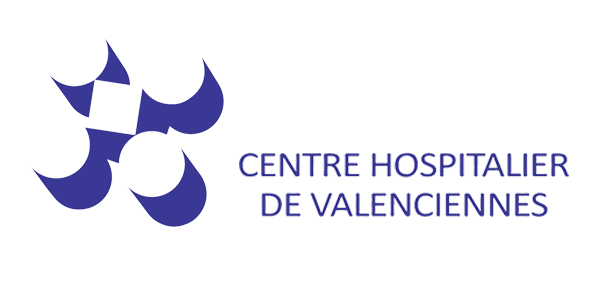
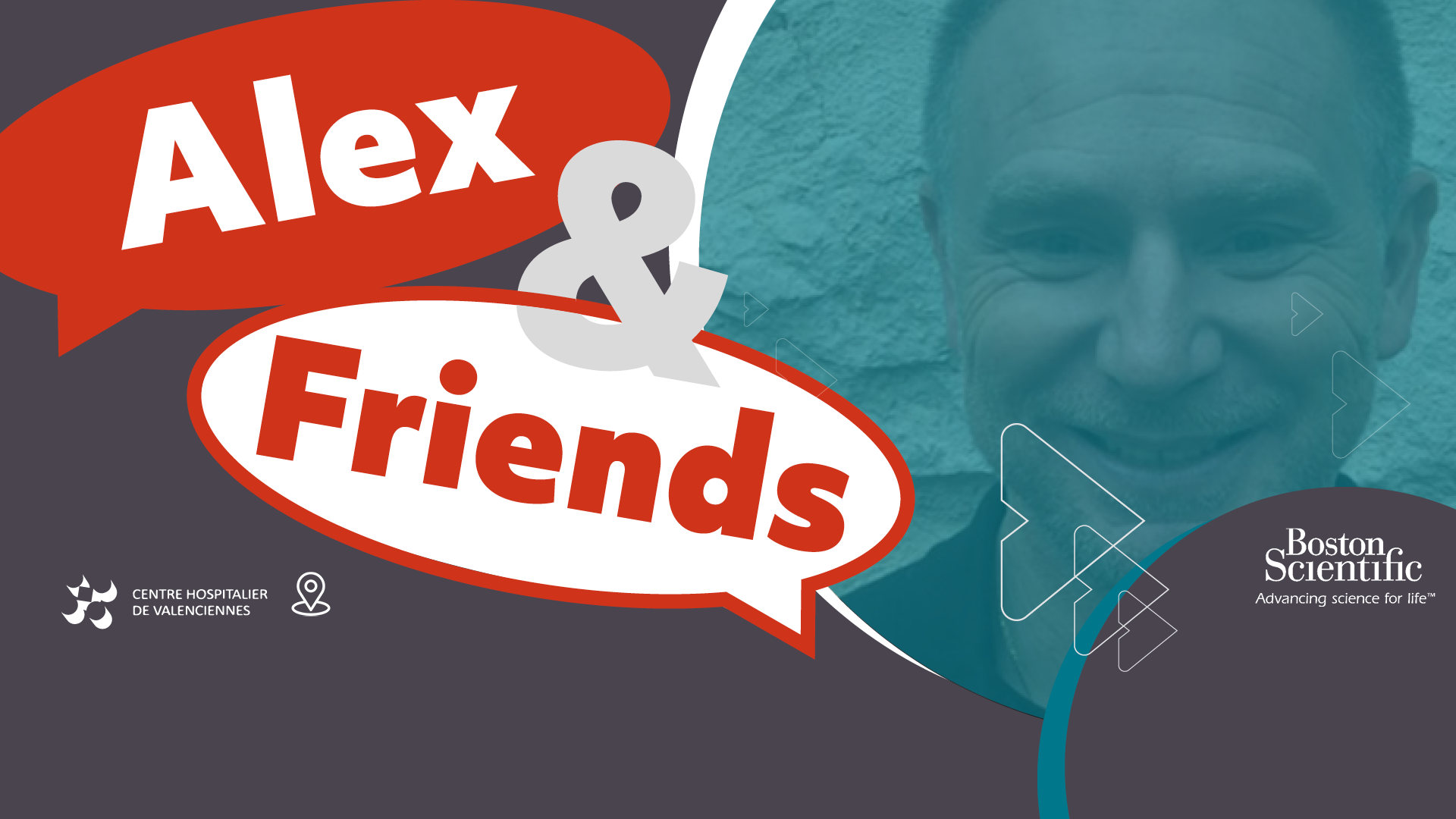
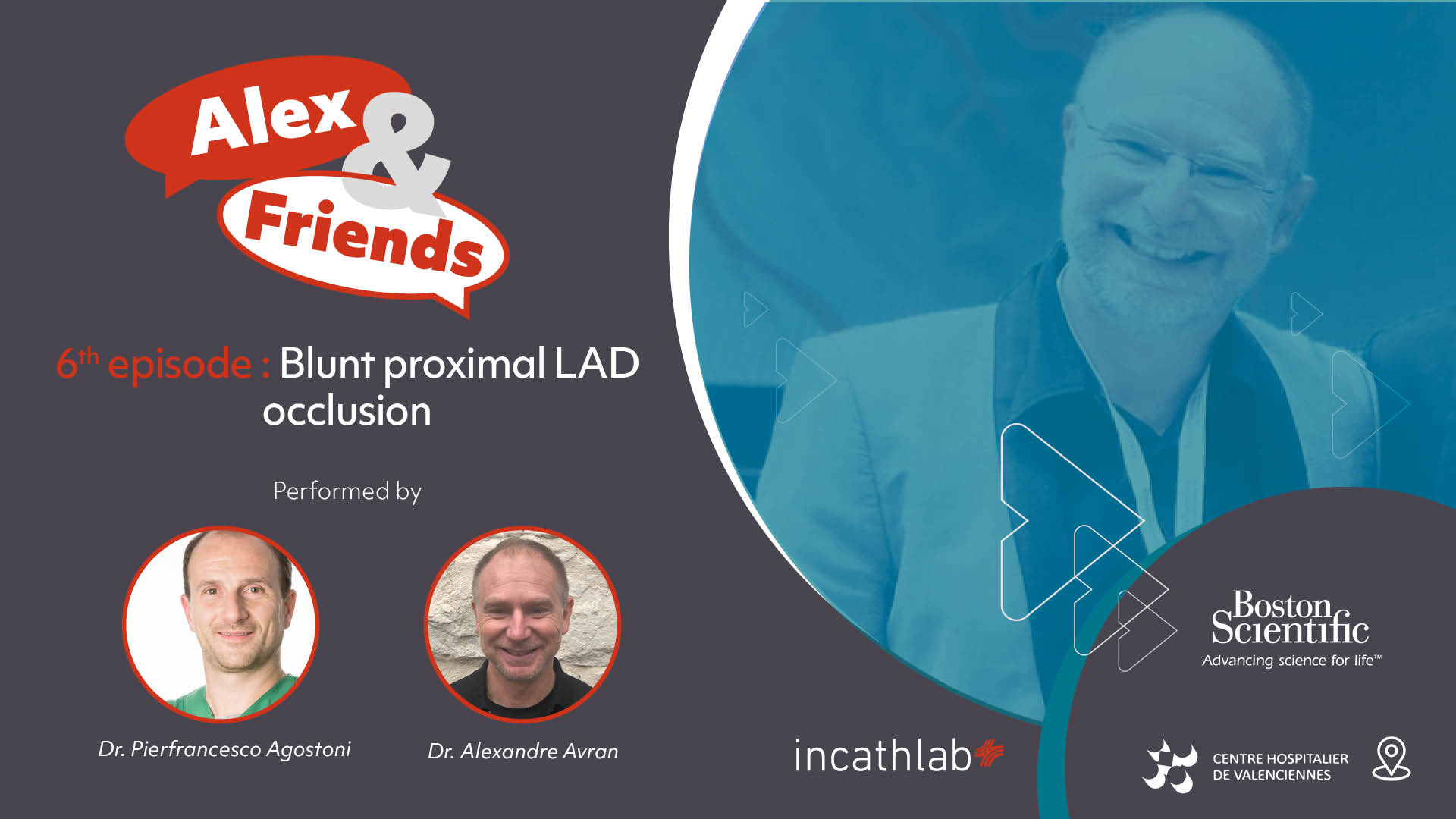
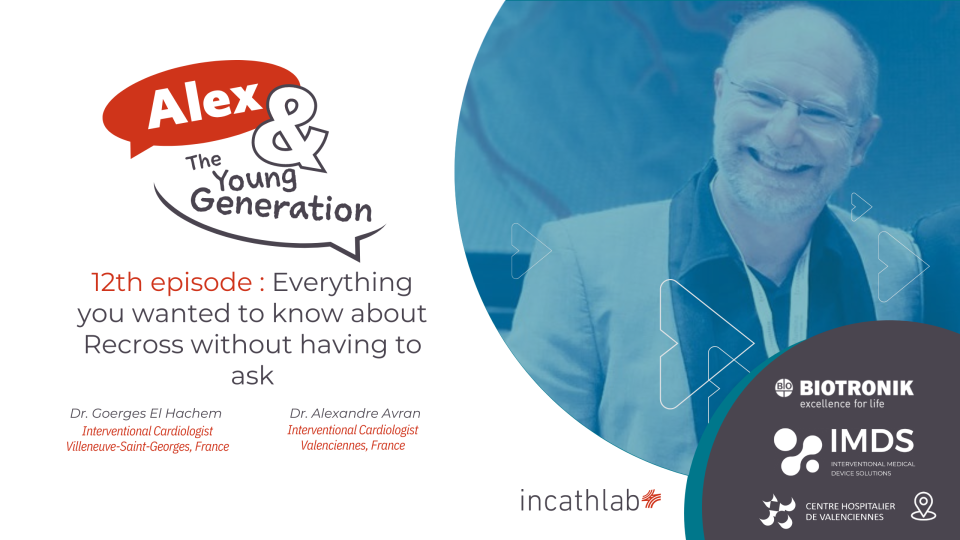
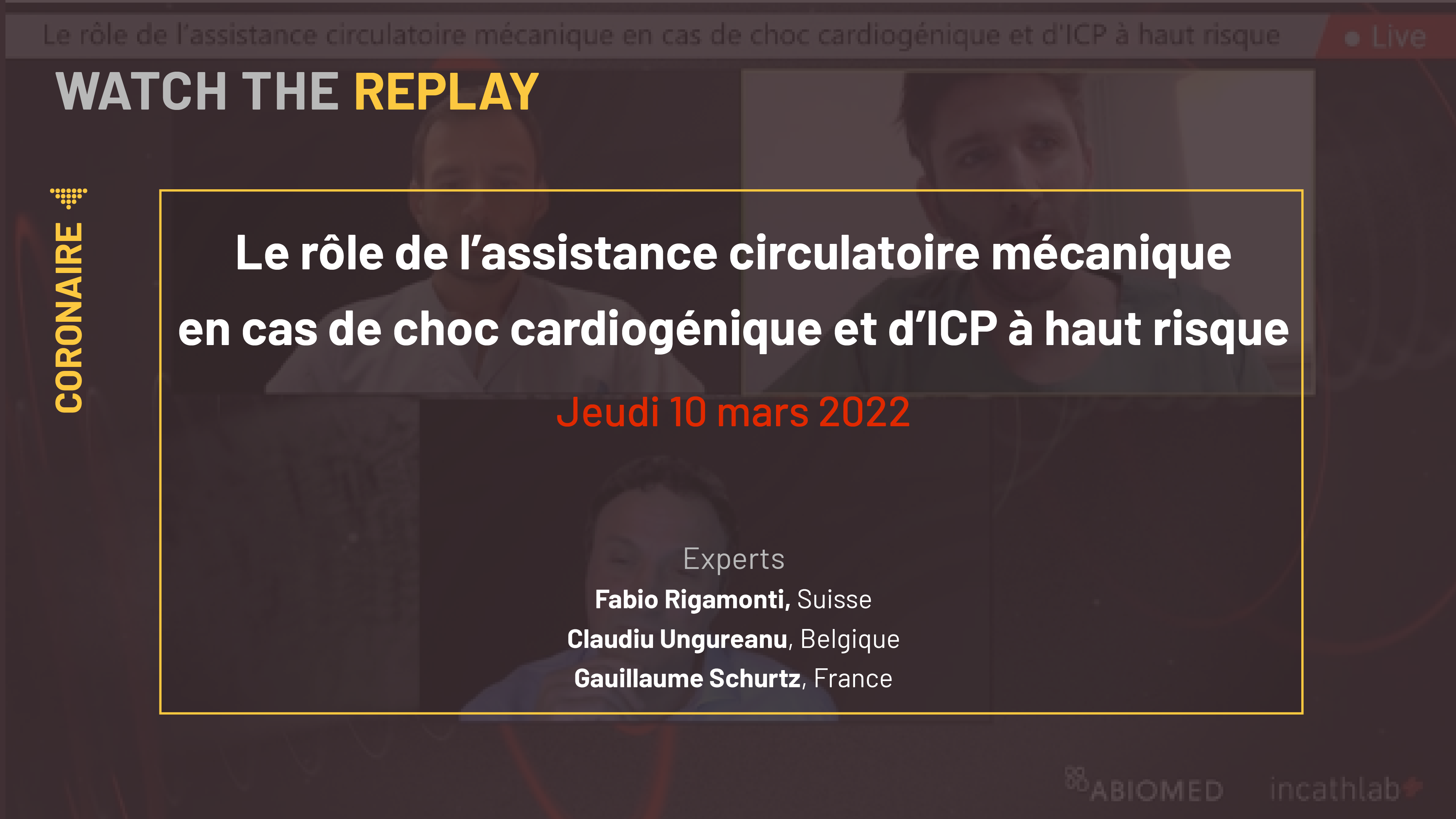
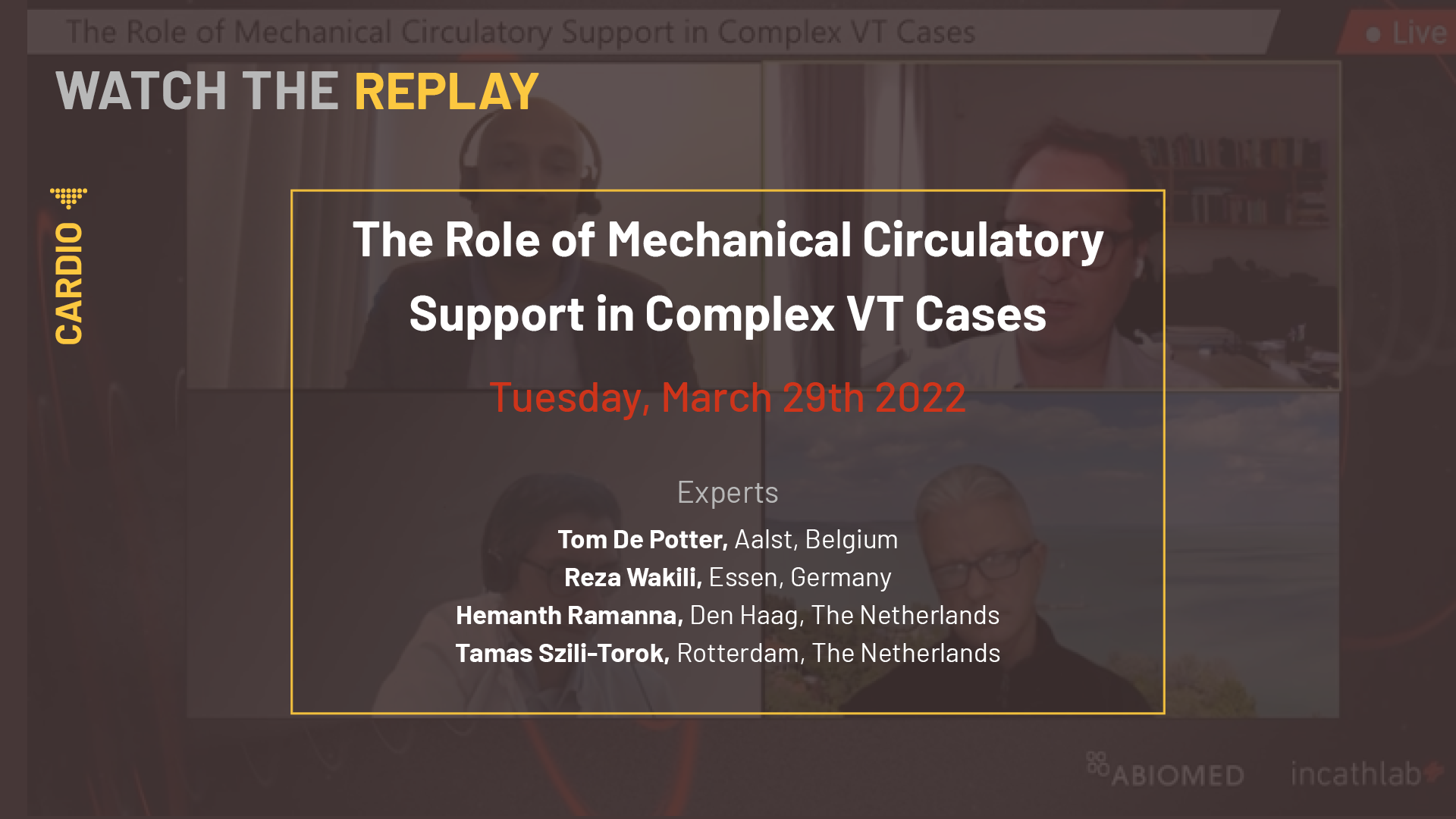
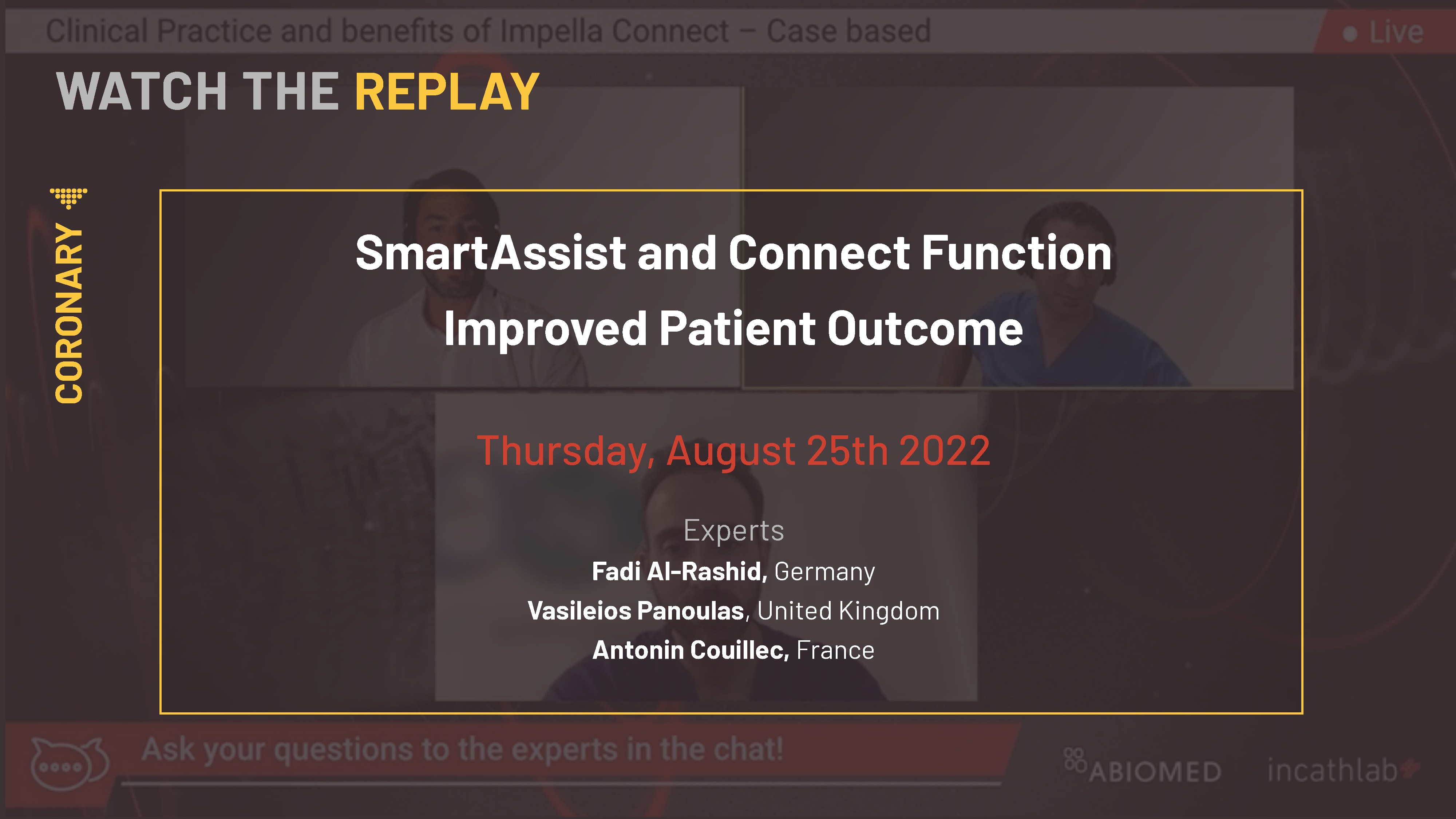

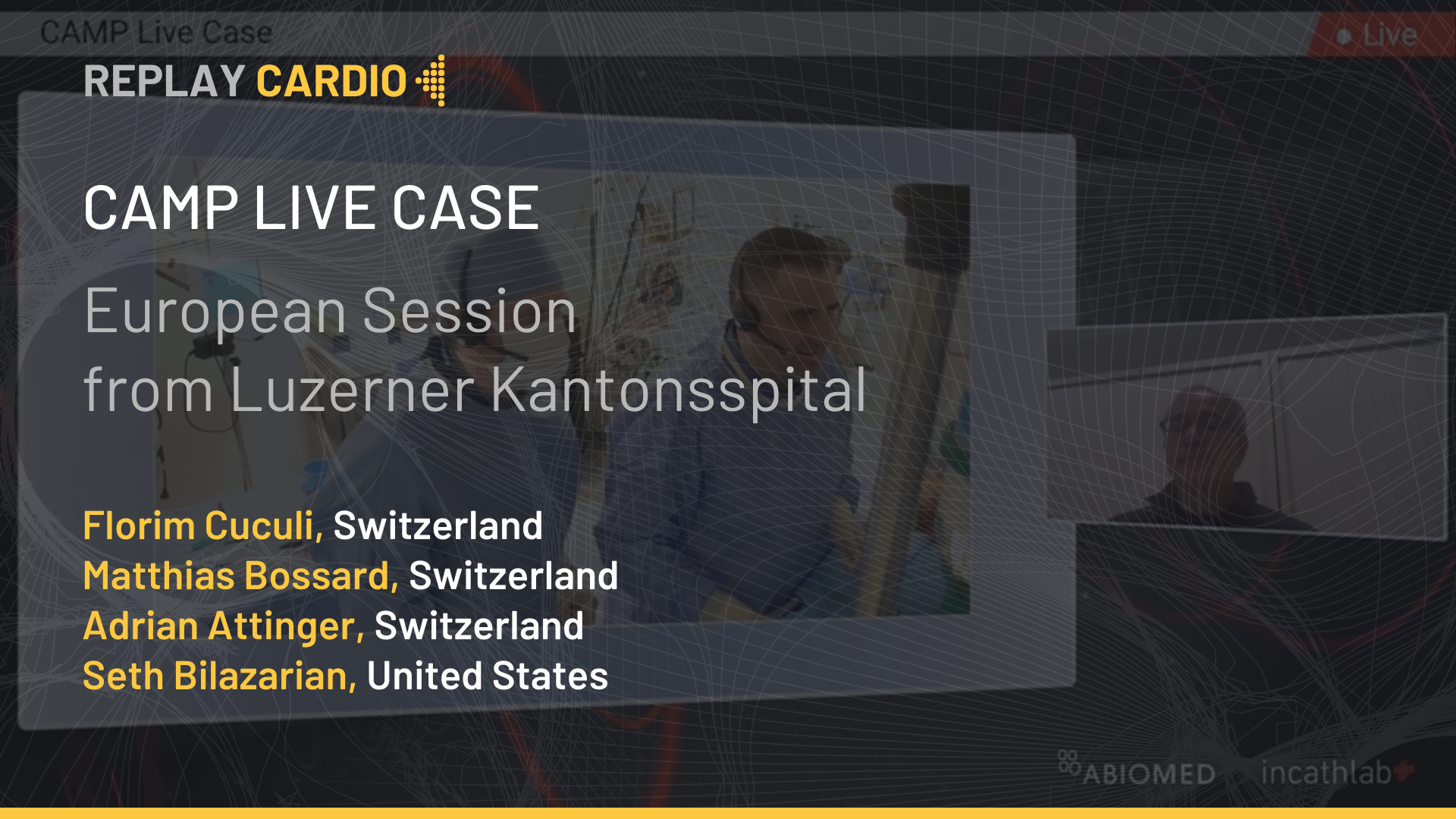
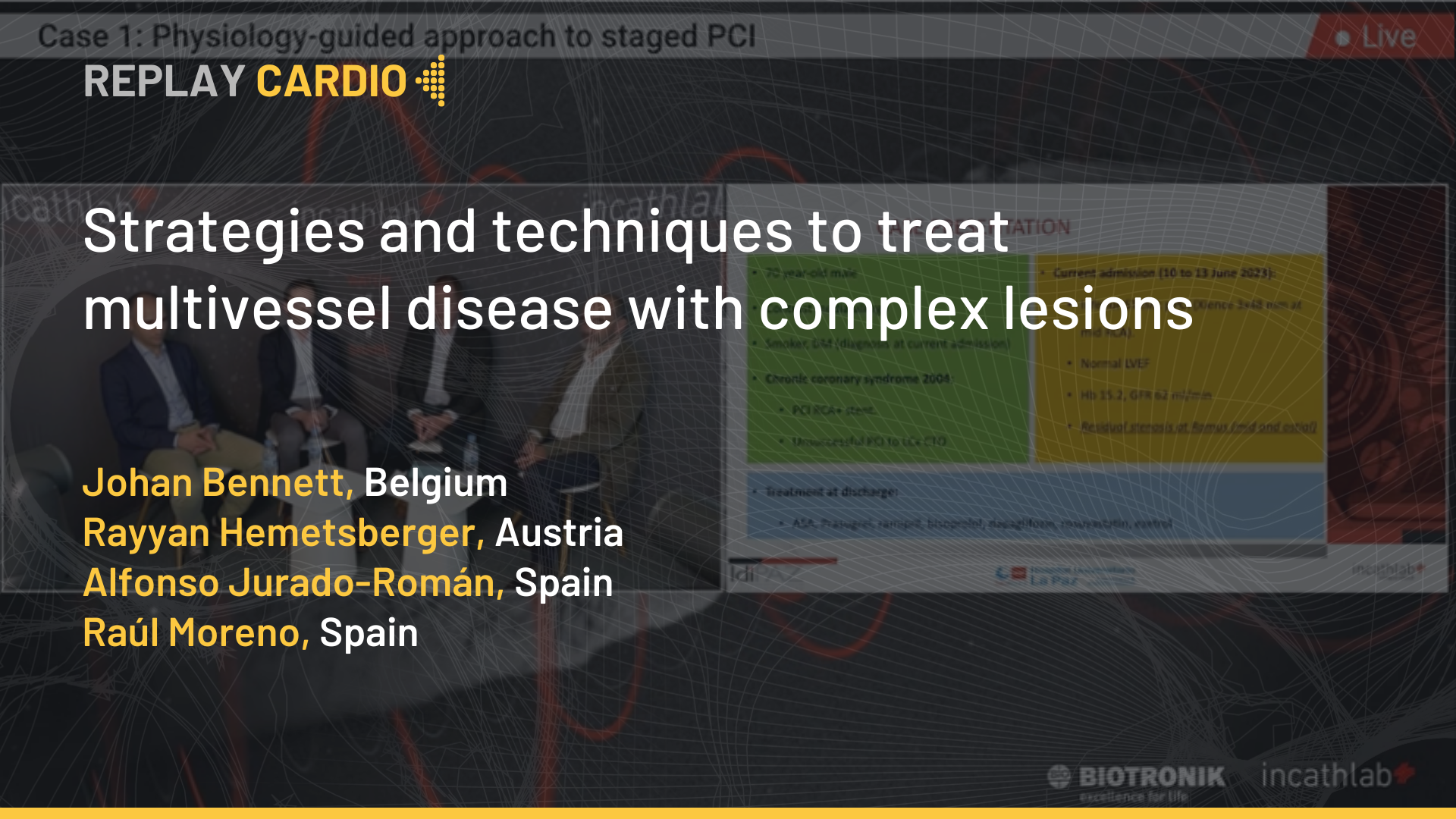

Bimlendu K. marvellous case, good teaching points, fair enough retrograde trial, very good demonstration of ivus guided puncture